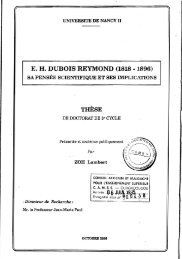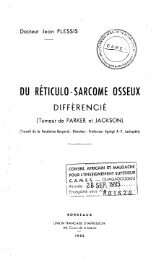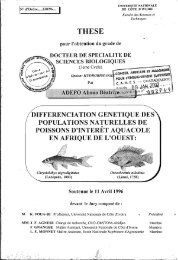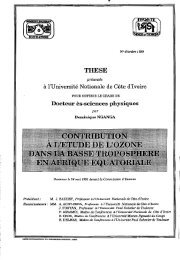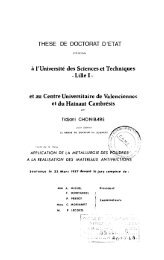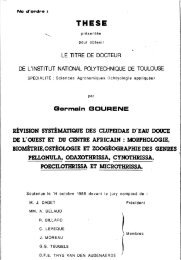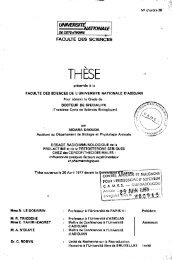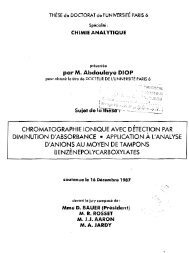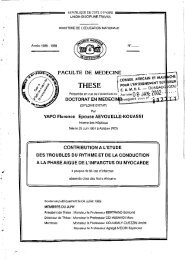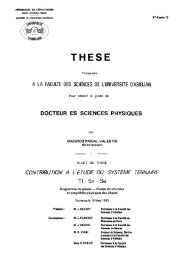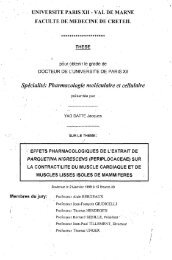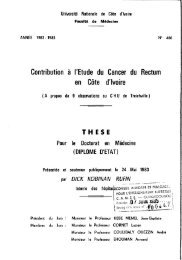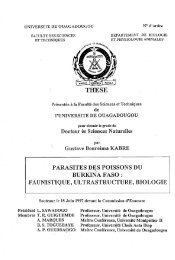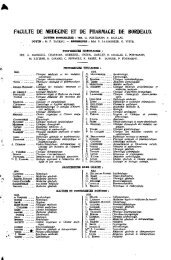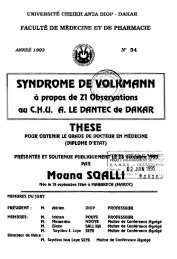Searching for a model of english: the teaching of english as a ...
Searching for a model of english: the teaching of english as a ...
Searching for a model of english: the teaching of english as a ...
Create successful ePaper yourself
Turn your PDF publications into a flip-book with our unique Google optimized e-Paper software.
Sciences sociales et humaines<br />
_<br />
,.<br />
SEARCHING FOR A MODEL OF ENGLISH :<br />
THE TEACHING OF ENGLISH<br />
AS A FOREIGN LANGUAGE IN TOGO<br />
INTRODUCTION<br />
Messan A. ADOTEVI<br />
Département d'Anglais<br />
UNIVERSITE DE LOME<br />
TOGO<br />
The general question <strong>of</strong>a <strong>model</strong> <strong>of</strong> English <strong>for</strong><br />
<strong>the</strong> EFL c1<strong>as</strong>sroom w<strong>as</strong> once <strong>for</strong>mulated in <strong>the</strong>se<br />
terms:<br />
Teachers <strong>of</strong> English abroad, especially perhaps<br />
those to whom English is a Foreign tongue must have<br />
<strong>as</strong>ked <strong>the</strong>mselves from time to time in recent years if ail<br />
is weil with <strong>the</strong> b<strong>as</strong>ic aim <strong>of</strong><strong>the</strong>ir <strong>teaching</strong> . Ail language<br />
-learning is essentially imitation, but imitation <strong>of</strong>what or<br />
whorn? If native users <strong>of</strong> English do not ail speak or<br />
write English alike , what is <strong>the</strong> <strong>for</strong>eign teacher to do ?<br />
Which <strong>for</strong>m <strong>of</strong> English should he adopt <strong>as</strong> a <strong>model</strong> <strong>for</strong><br />
himselfand his pupils ? There are in fact several variant<br />
<strong>for</strong>ms <strong>of</strong> <strong>the</strong> language with sorne claim to serve <strong>as</strong> a<br />
<strong>model</strong> ;hence<strong>the</strong>diffkulty . (Christorphersen, 1960: 127<br />
8).<br />
The question <strong>of</strong><strong>the</strong> <strong>model</strong> <strong>of</strong>English that should<br />
be taught in <strong>the</strong> schools and universities in French-speaking<br />
West Africa is not, however, a real issue at this moment.<br />
As in o<strong>the</strong>r EFL are<strong>as</strong>, a native speaker <strong>model</strong> is<br />
considered appropriate here. Still manya teacher <strong>of</strong>English<br />
in <strong>the</strong> West Africa context (EFL or ESL) would relate<br />
to <strong>the</strong> question raised above, or to <strong>the</strong> terms <strong>of</strong> <strong>the</strong><br />
following dilemma :<br />
As a Swede <strong>teaching</strong> in <strong>the</strong> English department <strong>of</strong> a<br />
Swedish University, 1am constantly faced with <strong>the</strong> problem<br />
<strong>of</strong>choosing a suitable variant or English to teach to<br />
undergraduatcs : British or American English, different<br />
styles <strong>of</strong>discourse and linguistic variants used by different<br />
strata <strong>of</strong><strong>the</strong> population, to mention <strong>the</strong> most obvious<br />
ones. Obviously, at university level, one does not normally<br />
have to face <strong>the</strong> naive leamer who demands to be<br />
taught what is 'right' or 'wrong' in English. Most undergraduates<br />
have greater sophistication and are more sensitive<br />
to <strong>the</strong> subtler nuances <strong>of</strong> language than that. Yet<br />
<strong>the</strong> problem <strong>of</strong> fmding a suitable variant to teach in not<br />
an e<strong>as</strong>y one to solve. (Tottie, 1977 : 203).<br />
Speaking <strong>of</strong> <strong>the</strong> language problem in African<br />
education two dec:tdes ago Strevens (1969) contended<br />
thatanglophone countries <strong>of</strong>Africa were in a transitional<br />
per.iod that would eventually see, <strong>as</strong> it were, Africans<br />
using English in national and international communica-<br />
IRev. CAMES - Série B, Vol 004, 2002<br />
tion "in ways that arejust <strong>as</strong> identifiable <strong>as</strong> Australian or<br />
American" and made this prediction:<br />
Be<strong>for</strong>e very long it is likely that <strong>the</strong> common<br />
features <strong>of</strong> African English - or at le<strong>as</strong>t <strong>of</strong>a west African<br />
or E<strong>as</strong>t African or Central African variety - will<br />
have becn authoritatively described in modern linguistic<br />
and phonetic terms. Once this h<strong>as</strong> been done it is a relatively<br />
small step in principle (though a very large one in<br />
practice )to <strong>the</strong> construction <strong>of</strong> specialized course materials<br />
<strong>for</strong> <strong>teaching</strong> English in which it is Africun English<br />
that <strong>for</strong>rns <strong>the</strong> implicit and explicit target (Strevens. 1969<br />
:195).<br />
The le<strong>as</strong>t one can sayat this stage is that nobody<br />
<strong>as</strong> yet actually teaches an African variety <strong>of</strong> English.<br />
and doubts are olten ra:sed <strong>as</strong> to whe<strong>the</strong>r such<br />
varieties <strong>of</strong> English (e.g. West African English) exist at<br />
ail and are identifiable in ways such <strong>as</strong> predicted by<br />
Strevcns, or are desirable targets in <strong>the</strong> c1<strong>as</strong>srooms.<br />
Under such circumstances <strong>the</strong> question clearly is "what<br />
<strong>model</strong> <strong>of</strong> ElIglish sustains <strong>the</strong> ef<strong>for</strong>ts <strong>of</strong> Togolese teach-<br />
- -<br />
ers <strong>of</strong> English?<br />
1. Is West African English a Suitable Target<br />
<strong>for</strong> West Arricau Students ?<br />
We have already said that a native-speaker<strong>model</strong><br />
is <strong>the</strong> generally accepted target in EFL are<strong>as</strong><br />
(Togo, Benin, Senegal, etc.). We must now add that even<br />
in ESL countries like Ghana or Nigeria where <strong>the</strong> local<br />
varieties <strong>of</strong> African English are said to exist <strong>the</strong> native<br />
speaker remains, paradoxically enough, <strong>the</strong> target in <strong>the</strong><br />
cl<strong>as</strong>srooms.<br />
Todd (1982) reports that "With <strong>the</strong> exception <strong>of</strong>Liberia,<br />
it would be accurate to claim that in most West African<br />
states, standard English is equated with British norrns"<br />
(P.186). And it will 00 just <strong>as</strong> accurate to say that in<br />
reality few West Africans speak English like Englishmen<br />
or like Americans (American norms are not disputed<br />
today) and most speak il identifiably Iike Africans.<br />
Strevens' contention that <strong>the</strong> latter do so "because <strong>of</strong><br />
<strong>the</strong> failure <strong>of</strong> English <strong>teaching</strong>, DOt because <strong>of</strong> its success"<br />
(1969 : 196) - does bring out <strong>the</strong> discrepancy 00<br />
tween <strong>the</strong> product emerging from <strong>the</strong> schools and <strong>the</strong><br />
"British English" policy.<br />
Should West African English, <strong>the</strong>n, be perceived<br />
<strong>as</strong> <strong>the</strong> target in <strong>the</strong> schools ?<br />
1 Should we say English in West Africa or<br />
West Arrican Engüsh ?<br />
The idea appeared in <strong>the</strong> carly sixties, advocated<br />
by Halliday et al (1964), that local varieties <strong>of</strong> English<br />
could perfectly be adopted <strong>as</strong> <strong>model</strong>s <strong>for</strong> <strong>the</strong> <strong>teaching</strong> <strong>of</strong><br />
English <strong>as</strong> a 5'lCOOdlanguage. T~"new EI)g1ishes"<br />
(<strong>as</strong> <strong>the</strong>y are sometimes called ) provide <strong>the</strong> countries<br />
11
----...,.....-----------------_Sclences sociales et humaines<br />
12<br />
where <strong>the</strong>y exist (<strong>for</strong>mer British colonies) with " <strong>the</strong>ir<br />
own '<strong>model</strong>' <strong>of</strong> English and permit <strong>the</strong> school generation<br />
to orient <strong>the</strong>ir learning towards a home - grown<br />
product ra<strong>the</strong>r than an imported one" (Halliday et al 1964<br />
: 294).<br />
West Africa <strong>for</strong> example h<strong>as</strong> a number <strong>of</strong> such<br />
countries ( e.g. Ghana, Nigeria, Sierra-Leone etc.) and<br />
"an educated West African English' is emerging to replace<br />
'British English with RP' <strong>as</strong> a mode!. It is still English<br />
<strong>as</strong> a <strong>for</strong>eign language, and <strong>the</strong> <strong>teaching</strong> <strong>of</strong> English<br />
is still an L2 operation" (Hallidayet al, 1964 : 294).<br />
Strevens (1981) now <strong>as</strong>sumes that this 'educated<br />
West African English' h<strong>as</strong> emerged <strong>as</strong> a full grown product,<br />
with an identity <strong>of</strong> it own, and it meets <strong>the</strong> "two<br />
b<strong>as</strong>ic criteria"<br />
he and his col1eagues once indicated <strong>as</strong> determining<br />
"whe<strong>the</strong>r a variety <strong>of</strong> English is acceptable <strong>for</strong> use <strong>as</strong><br />
an educational mode]" (Halliday et al, 1964 : 296)1. But<br />
<strong>the</strong> reality <strong>of</strong> what is known <strong>as</strong> West African English is<br />
still an elusive one. Strevens seems to posit - so do<br />
Platt et al (1984) - its existence ra<strong>the</strong>r than to refer to<br />
something indisputably established and recognized.<br />
Spencer (1971) examines <strong>the</strong> wide range <strong>of</strong> uses<br />
and users <strong>of</strong> <strong>the</strong> English language in West Africa and<br />
notes:<br />
As one might expect , <strong>the</strong>re are weil established<br />
terms necessitated by <strong>the</strong> use <strong>of</strong> English in natural and<br />
external environment previously <strong>for</strong>eign to il. A new tlora<br />
and fauna had to he coped wilh : hence such items <strong>as</strong><br />
silk carton tree, a ple<strong>as</strong>ant arbareal oxymoron <strong>for</strong> a<br />
very elegal/t tree. /lot. hawever exc!uâw to West Af<br />
rica .. or gr<strong>as</strong>s-cutter, a .l'mal! West African rodent.<br />
ln addition <strong>the</strong>re are <strong>the</strong> compounds which have been<br />
created to refer to objects or institutions which are ei<strong>the</strong>r<br />
truly indigenous, or tlle result <strong>of</strong><strong>the</strong> syncretism arising<br />
out <strong>of</strong><strong>the</strong> meeting and <strong>the</strong> mingling <strong>of</strong>European and<br />
African cultures: such terros <strong>as</strong>, <strong>for</strong> example, chewing<br />
- stick (a piece <strong>of</strong> wood from a particular kind <strong>of</strong> plant<br />
or tree used <strong>for</strong> c1eaning <strong>the</strong> teeth ), head - tie (Iength<br />
<strong>of</strong> c10th tied decoratively round <strong>the</strong> head <strong>of</strong>a WOl1lan ),<br />
market mammy (woman trader), mammy wagon (hybrid<br />
vehicle with a 10cal1y built body serving <strong>as</strong> both lorry<br />
and bus, and capable <strong>of</strong> carrying goods and - very uncom<strong>for</strong>tably<br />
- p<strong>as</strong>sengers from town to town) ... (Spencer,<br />
1971 : 28-29).<br />
Spencer goes on to point out a number <strong>of</strong> English<br />
terms which have not resisted, so to say, <strong>the</strong> semantic<br />
intluences from <strong>the</strong> local culture pattern - <strong>for</strong><br />
example kinship tenns such <strong>as</strong> "sister," "cousin" are <strong>of</strong>ten<br />
used in ways that would totally confus.: <strong>the</strong> white<br />
owners <strong>of</strong> <strong>the</strong> language, or such uses <strong>of</strong> <strong>the</strong> English<br />
phr<strong>as</strong>ai verbs <strong>as</strong> "dress up"(<strong>for</strong> example "Every morn-<br />
ing 1 dress up <strong>for</strong> breakf<strong>as</strong>t").<br />
Fur<strong>the</strong>rmore, what should <strong>the</strong> teacher make <strong>of</strong><br />
<strong>the</strong> use <strong>of</strong> <strong>the</strong> phr<strong>as</strong>ai verb 'dress up' <strong>as</strong> in <strong>the</strong> example<br />
above, or normalization such <strong>as</strong> '<strong>the</strong> absents' and '<strong>the</strong><br />
presents' which have ail found <strong>the</strong>ir way into <strong>the</strong> cl<strong>as</strong>sroom<br />
- au<strong>the</strong>ntic products imported from <strong>the</strong> world just<br />
outside <strong>the</strong> school ? Should he accept <strong>the</strong>m <strong>as</strong> 'West<br />
African use' or should he treat <strong>the</strong>m <strong>as</strong> errors ? Il is<br />
hard to tell.<br />
The term 'West African English' is widely used<br />
today but it does not translate <strong>the</strong> reality that sorne linguists<br />
<strong>as</strong>sume. Spencer says that "<strong>the</strong>re is certainly a<br />
sufficiency <strong>of</strong> terms and expressions peculiar to <strong>the</strong> use<br />
<strong>of</strong> English in this region to justify <strong>the</strong> term "West<br />
Africanism", even if it is not in many c<strong>as</strong>es e<strong>as</strong>y to say<br />
how widespread <strong>the</strong>y are or how permanent <strong>the</strong>y are<br />
Iikely to be" (1971 : 28).<br />
Todd (1982) doesn't believe in <strong>the</strong> indisputable<br />
existence <strong>of</strong> <strong>the</strong> so-called West African English ei<strong>the</strong>r,<br />
since, <strong>as</strong> he argues:<br />
...a definitive study h<strong>as</strong> not yet been made <strong>of</strong> standard<br />
West African English, although studies <strong>of</strong>Ghanaian and<br />
Nigerian English exist. It is a written standard b<strong>as</strong>ed mainly<br />
cn British norms, although it reflects West African culture<br />
especial1y III vocabulary. Standard English is, <strong>for</strong> <strong>the</strong><br />
moment, <strong>the</strong> only variety <strong>of</strong> English in West Africa with<br />
recognized orthography and <strong>the</strong> aim <strong>of</strong> most educated<br />
West Africans is that <strong>the</strong>ir use <strong>of</strong> <strong>the</strong> standard language<br />
should differ in no fundamental respect from standard<br />
British usage (Todd, 1982 : 285).<br />
Tregidgo ( 1987) doesn't say anything different,<br />
and he also , Iike Spencer, shows a concern <strong>for</strong> related<br />
language problems in <strong>the</strong> cl<strong>as</strong>srooms : Where English is<br />
a second language <strong>as</strong> opposed to a <strong>for</strong>eign language, it<br />
becomes to some extent <strong>the</strong> property <strong>of</strong> <strong>the</strong> non-native<br />
user; it is adapted to his or her own purposes, and re·<br />
flects his or her own culture. Africans <strong>the</strong>mselves have<br />
<strong>of</strong>ten resisted this notion, especially in <strong>the</strong> presence <strong>of</strong>a<br />
British teacher, and c!aim to want ta learn slandard<br />
British English. The fact remains that in West African<br />
countries English h<strong>as</strong> already been adapted in certain<br />
characteristic ways; in pronunciation, in vocabulary and<br />
general expression, even in certain marginal points <strong>of</strong><br />
grammar ; and many teachers will find difficulty in deciding<br />
how far to go in 'correcting' certain features in<br />
order to make <strong>the</strong>m con<strong>for</strong>m to <strong>the</strong> British norm. Shou Id<br />
one, <strong>for</strong> example, accept a storey-building : He h<strong>as</strong> travelled<br />
(<strong>for</strong> He is away) ; We are tight friends; <strong>the</strong>y were<br />
making noise, etc. , ail <strong>of</strong>which are commonly used in<br />
West African English ? Should one try to reduce <strong>the</strong> degree<br />
<strong>of</strong><strong>for</strong>mality in writing, or in greetings, which is ingrained<br />
in West African culture? Such questions remain<br />
Rev. CAMES - Série B, Vol 004, 2002 1
, ;<br />
--------'----------------''Sciences sociales et humaines<br />
,<br />
•<br />
highly debatable (p. 192).<br />
Throughout his discussion <strong>of</strong> <strong>the</strong> use <strong>of</strong> English<br />
in ESL communities in sub-Saharan Africa,<br />
Gorlach (1991), Shows his malaise <strong>as</strong> to identifYing<br />
'Englishes' or English on <strong>the</strong> continent - a malaise that<br />
clearly reads in <strong>the</strong> title <strong>of</strong><strong>the</strong> chapter that deals with<br />
<strong>the</strong> topic : "English in Africa - African English ?" He<br />
<strong>the</strong>n says he is using <strong>the</strong> terms " African English" and<br />
"West African English" only "Ioosely" (p.123) throughout<br />
<strong>the</strong> discussion, just <strong>as</strong> Quirk ( 1988) points out that<br />
we ail have only talked, so far, pretty freely <strong>of</strong> 'Nigerian<br />
Engl ish', 'West African English' ..., hypostat ising<br />
what remains at best ra<strong>the</strong>r general abstractions<br />
(p.234).<br />
And so <strong>the</strong> problem - English in West Africa - West<br />
African English ? - remains and is not e<strong>as</strong>ily solved.<br />
1 Ano<strong>the</strong>r kind <strong>of</strong> 'Heresy' ?<br />
A memorable reaction to Halliday et al. 's previously<br />
discussed proposai w<strong>as</strong> Prator's polemical paper<br />
"The British heresy in TESL" (1968) in which he<br />
poses <strong>the</strong> problem that interests us most here and expresses<br />
his position in a <strong>for</strong>thright way :<br />
...The heretical tenet 1 feel 1 must take exception to is<br />
<strong>the</strong> idea that it is best, in a country where English is not<br />
spoken natively but is widely used <strong>as</strong> <strong>the</strong> medium <strong>of</strong><br />
instruction, to set up <strong>the</strong> local variety <strong>of</strong> English <strong>as</strong> <strong>the</strong><br />
ultimate mode! to be imitated by those learning <strong>the</strong> language<br />
(Prator, 1968 : 459).<br />
Many <strong>of</strong>Prator 's arguments seem just <strong>as</strong> valid<br />
now to refute Strevens' later stand on <strong>the</strong> adoption <strong>of</strong><br />
West African English <strong>for</strong> <strong>teaching</strong> purposes, not only<br />
in <strong>the</strong> ESL contexts, blIt in <strong>the</strong> EFL are<strong>as</strong> <strong>as</strong> weil.<br />
Strevens justifies his position <strong>as</strong> follows :<br />
ln many parts <strong>of</strong><strong>the</strong> world, ..., those who use<br />
English have attitudes towards <strong>the</strong>ir local L2 <strong>for</strong>m <strong>of</strong><br />
English not greatly different from <strong>the</strong>' attitudes which<br />
native speakers have towards <strong>the</strong>ir LI <strong>for</strong>m <strong>of</strong>English:<br />
<strong>the</strong>y take it <strong>for</strong> granted <strong>as</strong> part <strong>of</strong> <strong>the</strong>ir corporate cultural<br />
identity. But <strong>the</strong>se identities are not <strong>the</strong> same in<br />
<strong>the</strong> two c<strong>as</strong>es; it is part <strong>of</strong><strong>the</strong> identity <strong>of</strong><strong>the</strong> L2-using<br />
community not to be <strong>the</strong> same <strong>as</strong> <strong>the</strong> British or Americans.<br />
Language education in a given country, <strong>the</strong>re<strong>for</strong>e,<br />
may necd <strong>for</strong> pragmatic re<strong>as</strong>ons to include English,<br />
but <strong>the</strong> pedagogical <strong>model</strong> selected <strong>for</strong> English<br />
must retlect local or regional characteristics. lt must<br />
(a) he mutually intelligible with ail o<strong>the</strong>r national and<br />
international <strong>for</strong>ms, but (b) it must also be different<br />
from ail o<strong>the</strong>rs, and (c) recognizably an L2 <strong>for</strong>In, not<br />
an LI <strong>for</strong>m (1981 : 88).<br />
So in Strevens' opinion, a local <strong>for</strong>m <strong>of</strong>English<br />
is suitable <strong>for</strong> ELT purposes provided that it exist in<br />
terms that he h<strong>as</strong> indicated "and is felt by<strong>the</strong> local speech<br />
community to be a desirable <strong>for</strong>m" (1981 :88). We may<br />
wonder, in c<strong>as</strong>e <strong>the</strong> local English "p<strong>as</strong>ses", so to slJeak,<br />
<strong>the</strong> intelligibility test, whe<strong>the</strong>r <strong>the</strong> o<strong>the</strong>r necessary differences<br />
Strevens demands matter at ail ! And <strong>as</strong> regards<br />
<strong>the</strong> "speech community" that is to "fcel" whe<strong>the</strong>r<br />
<strong>the</strong> local <strong>for</strong>m <strong>of</strong> English is desirable, does it include <strong>the</strong><br />
whole range <strong>of</strong> speakers - that is , speakers <strong>of</strong> pidgin<br />
English, "near-pidging" (Strevens' term), etc. - or is it<br />
limited to <strong>the</strong> educated elite, which is always a small<br />
minority in black Africa ?<br />
Kachru is ano<strong>the</strong>r linguist who h<strong>as</strong> written so<br />
extensively about <strong>the</strong> state and use <strong>of</strong> English in "<strong>the</strong><br />
outer circle"l that one can hardly discuss <strong>the</strong> i$suewe<br />
are concerned with here without mentioning him. He<br />
argues that :<br />
A non-native <strong>model</strong> may be treated <strong>as</strong> a competitive<br />
<strong>model</strong> <strong>for</strong> <strong>teaching</strong> Ellglish <strong>as</strong> L2 if it fulfills certain<br />
conditions. ln attitudinal ternls, a majority <strong>of</strong> L2<br />
speakers should identifY <strong>the</strong>mselvcs with <strong>the</strong> modij')ting<br />
label which marks <strong>the</strong> non-nativeness <strong>of</strong> a <strong>model</strong> : <strong>for</strong><br />
example, lndian English speakers, Lankan English<br />
speakers, Ghanaian English speakers. A person may<br />
be a user <strong>of</strong> lndian English but may not consider it <strong>the</strong><br />
"norm" <strong>for</strong> his linguistic per<strong>for</strong>mance. There is thus a<br />
confusion betwcen linguistic norm and linguistic hehavior<br />
(Kachru, 1982 : 39).<br />
lt appears through this and <strong>the</strong> ongoing discussions<br />
that <strong>the</strong> question <strong>of</strong> identification with <strong>the</strong> local<br />
English is a tricky one. We may <strong>as</strong>sume that educated<br />
speakers <strong>of</strong> <strong>the</strong> local <strong>for</strong>m-that is, those who substantially<br />
lise <strong>the</strong> language in <strong>the</strong>ir daily lives or activities <br />
are <strong>the</strong> persons who should normally identifY with it. But<br />
<strong>the</strong>y don't, <strong>as</strong> Sey appositely remarks :<br />
The linguist may be able to isolate features <strong>of</strong><br />
Ghanaian English and describe <strong>the</strong>m . But once <strong>the</strong>se<br />
are made known to him, <strong>the</strong> educated Ghanaian would<br />
strive to avoid <strong>the</strong>m altoge<strong>the</strong>r. The surest way to kill<br />
Ghanaian English, if it really exists, is to discover it and<br />
make it known" (1973: 10, quoted in Gorlach, 1991: 133).<br />
It is worth noting, fur<strong>the</strong>rmore ,that while sorne<br />
Nigerians are diffident about c1aiming <strong>the</strong> existence <strong>of</strong><br />
a Nigerian English and sorne o<strong>the</strong>rs boldly say <strong>the</strong>re is<br />
no such thing <strong>as</strong> Nigerian English (cf. Jibril, 1982), o<strong>the</strong>rs<br />
have no problem proclaiming, <strong>as</strong> it were, its existence<br />
and even identifYing a standard <strong>for</strong>m <strong>of</strong> it (e.g. Akere,<br />
1982; Bamgbose, 1982).<br />
Hence <strong>the</strong> tirnely remark by this Nigerian educator that<br />
"one obvious implication <strong>of</strong> titis discrepancy is that,<br />
<strong>for</strong> a long time to come, standards <strong>of</strong> correctness in<br />
Nigerian English will most liJcely remain a vexed question.<br />
A byproduct <strong>of</strong>this state <strong>of</strong> uncertainty is that<br />
1Rcv. CAMES - Série B, Vol 004, 2002<br />
13
________________________ Sciences sociales et humaines<br />
14<br />
man)' teachers <strong>of</strong>English in Nigeria will continue to<br />
be like <strong>the</strong> blind leading <strong>the</strong> blind, with <strong>the</strong> ultimate destination<br />
being hazy and cloudy" (Adegbija, 1989: 176).<br />
It 50 appears that <strong>the</strong> "heresy" Prator once denounced<br />
h<strong>as</strong> survived, and <strong>the</strong> number <strong>of</strong>"heretics" h<strong>as</strong><br />
somewhat grown - to <strong>the</strong> dismay <strong>of</strong> many. Kachru, one<br />
<strong>of</strong><strong>the</strong> "heretics", is reported to have said, with regard to<br />
<strong>the</strong> discrepancy just discussed, that if Nigerian, or<br />
Ghanian, or West African intellectuals or educational<br />
authorities have such a problem with English it is because,<br />
like o<strong>the</strong>r non-native users <strong>of</strong> English elsewhere,<br />
<strong>the</strong>y "seem to p<strong>as</strong>s through Iinguistic schizophrenia, unable<br />
to decide whe<strong>the</strong>r to accept a mythical non native<br />
<strong>model</strong>, or tô recognize <strong>the</strong> local functional <strong>model</strong> instead"<br />
(p. 982:50).<br />
But we would and actually can see Quirk (1988)<br />
in <strong>the</strong> role <strong>of</strong> Prator fighting this o<strong>the</strong>r "heresy". As he<br />
remarks:<br />
We have a vision <strong>of</strong>education systems confronting<br />
a complexity undreamed <strong>of</strong> in Germany or Japan,<br />
where <strong>the</strong>re is unquestioning acceptance <strong>of</strong> an external<br />
(i.e. native) standard <strong>for</strong> <strong>the</strong> <strong>teaching</strong> <strong>of</strong> English. And 1<br />
wonder how realistic <strong>the</strong> vision is . How Iikely is it that a<br />
minister <strong>of</strong> education in Delhi or Lagos will provide resources<br />
<strong>for</strong> <strong>teaching</strong> to a <strong>model</strong> derived from nonnative<br />
norms - - especial1y any that could be charactl;rized <strong>as</strong><br />
low on <strong>the</strong> ~Iine <strong>of</strong> Englishness ? It is not encouraging<br />
to retlect that, although Kachru h<strong>as</strong> been publishing on<br />
Indian English <strong>for</strong> 25 years - - prolifically, eloquently,<br />
elegantly - - <strong>the</strong>re is still no grammar, dictionary, or phonological<br />
description <strong>for</strong> any <strong>of</strong> <strong>the</strong>se nonnative norms<br />
that is, or could hope to become, recognized <strong>as</strong> authoritative<br />
in 1ndia, a description to which teacher and learner<br />
in lndia could turn <strong>for</strong> normative guidance, and from<br />
which pedagogical materials could be derived (p.235<br />
6).<br />
The question, <strong>the</strong>n, whe<strong>the</strong>r West African English<br />
should become <strong>the</strong> target in West African schools<br />
is, <strong>as</strong> it is, a vexed question - because, <strong>for</strong> one thing, not<br />
many West Africans or local eduéational authorities<br />
consider such a move desirable (Gorlach, 1991)2 and,<br />
<strong>for</strong> ano<strong>the</strong>r, and perhaps more importantly, no such English<br />
h<strong>as</strong> been described or given a status in terms such<br />
<strong>as</strong> those demanded by Quirk <strong>for</strong> example. As w<strong>as</strong> noted<br />
earlier on, such designations <strong>as</strong> Ghan8'Ïan English, Nigerian<br />
English, or West African English arejust being used<br />
"loosely" or "freely"- aIthough no ~ne can deny that<br />
<strong>the</strong> English language h<strong>as</strong> been adapted in certain ways:<br />
(phonological, grammatical, etc.), so <strong>as</strong> to be capable <strong>of</strong><br />
expressing <strong>the</strong> socio-cultural reality <strong>of</strong><strong>the</strong> milieu.<br />
1 See notes p. 20<br />
l See notes p. 20<br />
2. What <strong>model</strong> <strong>of</strong>English <strong>for</strong> ELT purposesin<br />
TOGO?<br />
ln EFL are<strong>as</strong> <strong>the</strong>re exists no local L2 <strong>for</strong>m <strong>of</strong> English<br />
: consequently <strong>the</strong> most suitable pedagogical <strong>model</strong> is<br />
usually a native-speaker <strong>model</strong>. In <strong>for</strong>eign-language<br />
<strong>teaching</strong> generally, <strong>the</strong> normally accepted target is that<br />
<strong>of</strong> <strong>the</strong> educated, metropolitan native speaker. Exceptions<br />
can occur : Togo provides a possible counter <br />
example. In Togo, English is a <strong>for</strong>eign language, but<br />
with Ghana and Nigeria so close, and given <strong>the</strong> wide<br />
public acceptance <strong>of</strong> West African English, it is not<br />
unre<strong>as</strong>onable if in Togo, too, this ESL <strong>for</strong>m becomes<br />
die target even in an EFL country. West African English<br />
seems a more suitable target <strong>for</strong> Togo children<br />
than British or American English (Strevens, 1981 :90).<br />
Perhaps <strong>the</strong> idea <strong>of</strong> West African English becoming<br />
<strong>the</strong> target in Togolese schools and institutions<br />
<strong>of</strong> higher education wouId appear, at present at (e<strong>as</strong>t,<br />
<strong>as</strong> <strong>the</strong> fad <strong>of</strong>some starry-eyed intellectuals. Although<br />
considered in light <strong>of</strong><strong>the</strong> general concern <strong>of</strong> e<strong>as</strong>ing <strong>the</strong><br />
language burden <strong>for</strong> <strong>the</strong> African student, or developing<br />
culturally suited materials <strong>for</strong> our situation, <strong>the</strong> proposaI<br />
may seem attractive.<br />
2.1 The Togolese context <strong>of</strong> Teaching<br />
1 Learning English<br />
Education in Togo <strong>as</strong> in most parts <strong>of</strong> Africa<br />
South <strong>of</strong> <strong>the</strong> Sahara, is a second language education<br />
(French in Togo). As such it is plagued with ail <strong>the</strong> problems<br />
created by <strong>the</strong> fact that young swdents have to<br />
learn a Foreign language - <strong>the</strong> medium <strong>of</strong> instruction in<br />
<strong>the</strong> school - while being taught in <strong>the</strong> same language.<br />
Perren (1969) observed <strong>the</strong> situation in English - speaking<br />
Africa and noted :<br />
The result h<strong>as</strong> been. <strong>of</strong>ten enough, that children have<br />
begun secondary courses with quite insufficient ability<br />
to do more than memorize selected texts or parts <strong>of</strong><br />
<strong>the</strong>m, with very low reading skill and without <strong>the</strong> ability<br />
to discuss, question or criticize facts, ide<strong>as</strong> or doctrines.<br />
They have indeed p<strong>as</strong>sed unsuitablc examinations on<br />
this b<strong>as</strong>is, but it can be qUt:stioned whe<strong>the</strong>r <strong>the</strong>y have<br />
been educated into citizens whose full pOlential can be<br />
exploited. The situation persists into university education<br />
and possibly colors <strong>the</strong><strong>teaching</strong> <strong>as</strong> weil <strong>as</strong> <strong>the</strong> leaming<br />
(Perren, 1969: 202).<br />
The same words can still describe <strong>the</strong> situation<br />
today, not only in anglophone countries, but in<br />
francophone are<strong>as</strong> <strong>as</strong> well. Recent rcsearch focuscd<br />
on <strong>the</strong>se latter are<strong>as</strong> h<strong>as</strong> demonstrated that <strong>the</strong> swdents<br />
do not understand what <strong>the</strong> teacher says; and do<br />
not understand what <strong>the</strong>y read in <strong>the</strong>ir books - which is<br />
in fact a réal Iiteracy problem in <strong>the</strong> cJ<strong>as</strong>sroom, and at<br />
Rev. CAMES - Série B, Vol 004, 2002 1<br />
•
------------------------Sclences soclales et humaines<br />
•<br />
11.<br />
'"<br />
alllcveis (Champion 1986; Chaudenson, 1989).<br />
Lafage (1985) reports that when <strong>the</strong> deterioration<br />
<strong>of</strong>education in Togo became so acute <strong>as</strong> to become<br />
<strong>the</strong> concern <strong>of</strong> public opinion - and much to <strong>the</strong> embarr<strong>as</strong>sment<br />
<strong>of</strong><strong>the</strong> educational authorities - it w<strong>as</strong> French,<br />
<strong>the</strong> medium <strong>of</strong> instruction in <strong>the</strong> schools, that w<strong>as</strong> tirst<br />
incriminated. And rightly so.<br />
The following p<strong>as</strong>sage from The Village <strong>of</strong>Waiting<br />
(1988) in which <strong>the</strong> author. George Packer, recounts<br />
his experience <strong>as</strong> a Peace corps Volunteer <strong>teaching</strong> EFL<br />
in Togo describes a situation 1 know weil, and is eloquent<br />
about what kind <strong>of</strong>, and how, <strong>teaching</strong>ilearning<br />
"happens" in <strong>the</strong> literacy - impoverished c1<strong>as</strong>sroom :<br />
Then <strong>the</strong>re were <strong>the</strong> copybooks. In <strong>the</strong> almost<br />
complete absence <strong>of</strong> textbook, <strong>the</strong>se lined notebooks<br />
became <strong>the</strong> students' lifeline. They also seemed to take<br />
<strong>the</strong> place <strong>of</strong>thinking. In <strong>the</strong>ir copybooks students wrote<br />
down with <strong>the</strong> care <strong>of</strong>medieva1scribes every word <strong>the</strong>ir<br />
teacher deemed important enough to utter. Enter a mistake<br />
in one and it might never get corrected ; lose one<br />
and a student might <strong>as</strong> weil quit school. 1 once had to<br />
correct a geography teacher's exam. One <strong>of</strong> Kafui's<br />
questions w<strong>as</strong><br />
"Qu'est-ce que le Nil?" (What is <strong>the</strong> Nile ?) ln<br />
response, every studeqt wrote : "Le Nil est loin des plus<br />
grands fleuves du monde" - a piece <strong>of</strong> nonsense<br />
translating to "The Nile is far from <strong>the</strong> biggest rivers in<br />
<strong>the</strong> world." 1 had marked twenty tive answers wrong<br />
be<strong>for</strong>e 1 understood <strong>the</strong> mistake. The c1<strong>as</strong>s had thought<br />
she said "loin des plus grands" instead <strong>of</strong>"l'un des plus<br />
grands" ("one <strong>of</strong><strong>the</strong> biggest ...") and duly inscribed <strong>the</strong><br />
mistake in <strong>the</strong>ir copybooks. The sentence had gone from<br />
mouth to copybook to exam Iike a defective prodùct<br />
moving along an automated <strong>as</strong>sembly line.<br />
Kafui laughed at <strong>the</strong> error, at <strong>the</strong> students' stupidity <br />
but not at <strong>the</strong> system that wanted mimicry without<br />
thought. The} should have listened better, she said (p.<br />
54).<br />
It is, <strong>the</strong>n, in a context <strong>of</strong>serious language difficulties<br />
( to say nothing <strong>of</strong>o<strong>the</strong>r difficulties, e.g. poverty,<br />
<strong>the</strong> large cl<strong>as</strong>ses) that <strong>the</strong> <strong>teaching</strong> and learning <strong>of</strong> Eng1ish<br />
take place. It is not surprising that <strong>the</strong> result <strong>of</strong><br />
such an enterprise is generally poor . What Obanya (1971 )<br />
tells us about <strong>the</strong> situation in Senegal is true <strong>of</strong>Togo and<br />
o<strong>the</strong>r francophone countries <strong>as</strong> weil; "English h<strong>as</strong> always<br />
been a compulsory subject but people have <strong>for</strong><br />
long felt dissatistied with <strong>the</strong> way it is taught. Almost<br />
every Senegalese undergraduatecomplains <strong>of</strong>his inability<br />
to speak English in spite <strong>of</strong>years' compulsory study <strong>of</strong><br />
<strong>the</strong> language in <strong>the</strong> secondary school" ( p.132).<br />
Secondary school students generally show a<br />
very favorable attitude towards English in <strong>the</strong> beginning,<br />
but <strong>the</strong> motivation is not maintained throughout<br />
<strong>the</strong> school career. Sorne <strong>of</strong> <strong>the</strong> causes <strong>of</strong> <strong>the</strong> loss <strong>of</strong><br />
interest are <strong>the</strong> overemph<strong>as</strong>is on <strong>the</strong>oretical grammar,<br />
translation, and <strong>the</strong> lack <strong>of</strong>opportunity to use English.<br />
Sometimes English is not even used in c1<strong>as</strong>s. There is<br />
also <strong>the</strong> fact that cl<strong>as</strong>sroom procedures are too <strong>of</strong>ten<br />
examination driven, and English h<strong>as</strong> a "general education<br />
subject" label attached to it, which makes it a subject<br />
routinely taught and tested.<br />
It appears necessary to rebuild. <strong>as</strong> it were, <strong>the</strong><br />
<strong>teaching</strong> <strong>of</strong> English in Togo today. This requires sorne<br />
kind <strong>of</strong>rcappraisal <strong>of</strong><strong>the</strong> philosophy or general attitude<br />
that in<strong>for</strong>ms cl<strong>as</strong>sroom practices and language education<br />
objectives. And this is one <strong>of</strong> <strong>the</strong> things 1 bclieve.<br />
2.2 Wbat 1 Believe<br />
Since West African English (Ghanaian. Nigerian,<br />
etc.) do not exist in a sense earlier indicated, none<br />
<strong>of</strong><strong>the</strong>m can be taken into <strong>the</strong> c1<strong>as</strong>sroom in Togo. Nei<strong>the</strong>r<br />
<strong>the</strong> educational authorities - no <strong>of</strong>ficial document<br />
1have consulted on <strong>the</strong> <strong>teaching</strong> <strong>of</strong> English at <strong>the</strong> various<br />
levels says anything about <strong>the</strong> <strong>model</strong> <strong>of</strong> English to<br />
be taught, which is an indication that <strong>the</strong> tradition <strong>of</strong><br />
<strong>teaching</strong> an overse<strong>as</strong> <strong>model</strong> remains unquestioned <br />
nor do <strong>the</strong> students 1 know feel it desirable to teach/<br />
(earn an English <strong>of</strong> <strong>the</strong> neighborhood.<br />
Richards' contention is upheld here - a b<strong>as</strong>ic<br />
motivational difference between <strong>the</strong> learning <strong>of</strong>English<br />
in ESL and EFL settings is that, in <strong>the</strong> latter, "<strong>the</strong>re is<br />
always an ef<strong>for</strong>t to acquire an overse<strong>as</strong> standard <strong>for</strong>m<br />
<strong>of</strong> Engl ish" ( 1979 : 107).<br />
If <strong>the</strong> <strong>model</strong> in Togo is <strong>the</strong> educated native<br />
speaker <strong>model</strong> <strong>as</strong> it is in EFL in general. One may<br />
wonder whe<strong>the</strong>r this is not setting unrealistic goals <strong>for</strong><br />
<strong>the</strong> students or inviting <strong>the</strong>m to do so <strong>the</strong>mselves. Smith<br />
( 1983) makes interesting remarks about language <strong>model</strong><br />
and per<strong>for</strong>mance target that seem opportune in answering<br />
that question:<br />
... PERFORMANCE TARGET relates to <strong>the</strong><br />
LANGUAGE MODEL but need not be identical to it .<br />
The target is what we are aiming <strong>for</strong> . It is what we<br />
want our students to be able to do when <strong>the</strong>y complete<br />
<strong>the</strong>ir work in our educational system. Vou will note that<br />
, <strong>the</strong> per<strong>for</strong>mance target in a <strong>for</strong>eign language situation<br />
is to achieve <strong>the</strong> per<strong>for</strong>mance level <strong>of</strong> <strong>the</strong> educated<br />
native speaker. It is <strong>the</strong> same <strong>as</strong> <strong>the</strong> LANGUAGE<br />
MODEL. This h<strong>as</strong> always becn <strong>the</strong> goal in <strong>the</strong> <strong>for</strong>eign<br />
language situation,<br />
yet it is almost never reached . In fact, very few teachers<br />
expect any <strong>of</strong><strong>the</strong>ir students to achieve this level <strong>of</strong><br />
1..., CAMES - Série 8, Vol 004, 2002<br />
15
__________~<br />
Sciences sociales et humaines<br />
]6<br />
m<strong>as</strong>tery. but it is <strong>the</strong> target ncver<strong>the</strong>less . This is also<br />
<strong>of</strong>ten Ihe cause in s(:cond language situation but sometimes<br />
institutions and leachers aim <strong>for</strong> <strong>the</strong> per<strong>for</strong>mance<br />
level <strong>of</strong>an edueated speaker orlhe local English variety<br />
( p.18).<br />
1 bclieve Ihal. ail things considered. El T in<br />
1 ngo çan keep away l'rom Ihe debate <strong>of</strong> adoptill," dll<br />
"appropriate mode!"' <strong>of</strong> English <strong>for</strong> Ihe çomexl. \\ ithout<br />
things getting worse Ihan <strong>the</strong>y are in <strong>the</strong> field at<br />
present. The besl lllle can wish is thal English leachcrs<br />
in Togo become aware <strong>of</strong> sueh debales and. bc<br />
)ond this. <strong>of</strong> <strong>the</strong> Iheories or a'iSlllnptinns Ihat infilrln<br />
<strong>the</strong>ir practices - <strong>for</strong> <strong>the</strong>y ma) he çalled upnn lojustify<br />
<strong>the</strong>se anv lime. or be made hl lecl inalÎequale il <strong>the</strong>y<br />
çan'1.<br />
Alread). Smith rightly points out that in this<br />
allo o<strong>the</strong>r similar cnntexts where Ihc 1l1Ooei is <strong>the</strong> eOIlcated<br />
native speakcr mode\. "non-nat ivc English<br />
,peaking teachers arc made to teei inadequate. nn<br />
matter ho\\ pr<strong>of</strong>kient <strong>the</strong>y arc" (1983 :18). And suppnse<br />
cf· L leachers in TOGO no\\ set nut to teach an<br />
African <strong>model</strong> <strong>of</strong> <strong>the</strong> language Ihey <strong>the</strong>mselves arc<br />
not pr<strong>of</strong>ieiem in. nr do not know thc e:>.istcnce <strong>of</strong> (<strong>as</strong><br />
'iuming that such J\friean Englishes cxist! ... ) what \\ill<br />
<strong>the</strong> outC()l11e be? Uner confusion. without any doubt.<br />
Conclusion<br />
lt eventually appears thal <strong>the</strong> e:>.isting <strong>model</strong> nfEngl<br />
ish that is taught in Tllg()/ese cl<strong>as</strong>srllllms -- and l110rc<br />
generally in francophlllle west Africa --ean pl"{wide<br />
<strong>the</strong> studem \Vith <strong>the</strong> kind nI' bnglish <strong>the</strong>y nccd to fUIll:<br />
tion in various contexts. n()n-native and native. The<br />
nllltivation <strong>for</strong> iearning an merse<strong>as</strong> standard fml11 <br />
which is still very mueh alive among <strong>the</strong>se students <br />
can only be thwarted by a thoughtless or 1:I1al1l:Y introduet<br />
ion <strong>of</strong> a nl'n-nat ive <strong>for</strong>m <strong>of</strong> bnglish into <strong>the</strong><br />
cl<strong>as</strong>srool11. J\nd motivali()n. <strong>as</strong> wc know is ail impor<br />
Innt <strong>for</strong> learning t() happen.<br />
What docs not seem to comc up at eonferenœs and<br />
seminars on leacher education i'i hl)\\' mali) l'Iher kind'i<br />
<strong>of</strong>Engli'ih should tead1ers he familiar with') Can teachcrs<br />
read sciemiriç Fnglish? Is <strong>the</strong>ir scicnœ education<br />
haçkground wnduçi\e tn sueh an aelivity'~ Are teachcrs<br />
able to ditferemiate hetwcen <strong>the</strong> sl,eial scicnces<br />
and <strong>the</strong> natllral 'icienccs. and <strong>the</strong> way <strong>the</strong> two groups<br />
<strong>of</strong> di'iciplines arc treated b) wrilers'? Are bo()ks being<br />
written <strong>for</strong> non- native teachers to help <strong>the</strong>m move<br />
towards <strong>the</strong> reading <strong>of</strong> <strong>the</strong> two branches <strong>of</strong> sçienœs<br />
to serve <strong>the</strong>ir nceds '? At <strong>the</strong> o<strong>the</strong>r end are <strong>the</strong> trades<br />
and v()cations'? How are teaehers to prepare students<br />
tllr <strong>the</strong> kinds <strong>of</strong> English that <strong>the</strong>y must know t() mect<br />
<strong>the</strong>ir purposes in life -to become hotel boys, or tourist<br />
guides. or seientists, ifthcy <strong>the</strong>mseives. <strong>the</strong> teachers, do<br />
not learn about <strong>the</strong>se occupations and know how tl:ose<br />
engaged in Ihem communieate ? '" (Debysuvarn, 1981:<br />
88-89).<br />
These are very illleresling questions tor EFL<br />
teaehers in llur eontcxts. How do wc explain <strong>the</strong> fact<br />
Ihal sOl11any ESP or EST "arrangements" tàil? Are <strong>the</strong><br />
needs <strong>of</strong> special interest group~ met in <strong>the</strong> cl<strong>as</strong>srooms ?<br />
And abo\'C ail is ELT addressing tb~ Ilirger ~Oll:<br />
cern <strong>of</strong> litcraey - in a country llr eountries where English<br />
holds <strong>the</strong> I110St favored positinn among <strong>the</strong> o<strong>the</strong>r <strong>for</strong>eign<br />
languages? Il cano and it is high time EFL teaehers "dis<br />
~oyere(rthis pntemiality nf<strong>the</strong>ir pr<strong>of</strong>ession in <strong>the</strong>~e West<br />
African seHings.<br />
NOTES<br />
1. It is possible to suggest twn h<strong>as</strong>ic critcria tll Jetermine<br />
whe<strong>the</strong>r a varietv nf Fnglish is accePtable <strong>for</strong><br />
use <strong>as</strong> an edueational mode!. Fir,!, it must bc a variet~<br />
açtually used hy a rea,onabl) large body or<strong>the</strong> pnpulatinn.<br />
in particular by a proportion <strong>of</strong>tllll'ie \vhose le\el<strong>of</strong><br />
education makes <strong>the</strong>m. in n<strong>the</strong>r rcspects. desirabie l11odcl>.<br />
!his mean'i that wc wou Id exclude f
-----------------------~Sciences sociales et humaines<br />
"mean~,<br />
•<br />
•<br />
•<br />
<strong>the</strong> written and spoken text which is usoo in <strong>the</strong><br />
c1<strong>as</strong>sroom <strong>as</strong> examplcs <strong>of</strong><strong>the</strong> so-callcd "standard" The<br />
textbook IIl1d <strong>the</strong> tapes 111 <strong>the</strong> language lab wou1d be<br />
included under this he!'cting" (1983: J8).<br />
RHERENCES<br />
Adegbija, E. J989 - "LexÎ::o-Semantic '/a~iatiol1<br />
ln Nigerian English".<br />
ln World Englishes. 8.2<br />
Akere, F. 1982 - "Socio Cultural Constraints and<br />
<strong>the</strong><br />
Emergence <strong>of</strong> a Standard Nigerian<br />
English" in J.B Pride, (ed.) New Englishes,<br />
Newsbury house Publishers, Rowley M<strong>as</strong>s.<br />
- Bangbose, A. 1982 - "Standard Nigerian English:<br />
Issues <strong>of</strong><br />
Identification" in B.B. Kachru (ed.).The O<strong>the</strong>r<br />
Tongue University <strong>of</strong> Illinois Press, Urbana, Chicago.<br />
Bokamba E.G. 1982 - "The Africanization <strong>of</strong> English<br />
." in B.B. Kachru (00.) op.cit.<br />
Champion J. 1986 Language et pédagogie en<br />
France et en Afrique. Edition Antthropos, Paris.<br />
Chaudenson, C. 1989 Langue, Economies et Développement.<br />
Institut d'Etudes Creoles et Francophones - Uriiversité<br />
de Provence.<br />
Christophersen, P. 1960 - "Towards a Standard <strong>of</strong><br />
International English. In ELT, 14,3.<br />
Deby<strong>as</strong>uvarn, MLD. 1981 "Wili EIIL SucceOO<br />
where ESL and<br />
EFL Fail?" in L.E. Smith (00.) English For Cross<br />
Cultural Communication. St. Martin's Press,<br />
New York<br />
Gorlach, M. 1991 - Englishes. John Renjamin's Pub!.<br />
Comp. Amsterdam, Philadelphia<br />
- Halliday M.A.K. Mc. Intosh, A., Strevens, P.,<br />
1964.<br />
The Linguistic Sciences and Language Teaching.<br />
Indiana University Press. Bloomington<br />
Jibril, M. 1982 "Nigerian English: an Introduction"<br />
in J.B. Pride (00.) New Englishes. Newdury House<br />
Publishers. Rowley, M<strong>as</strong>s.<br />
Jolly, R. (00.) 1969. English in African Education:<br />
Research<br />
and Action. E<strong>as</strong>t African Publishing House. Nairobi<br />
Kachru, B.B. 1976. "Models <strong>of</strong>English <strong>for</strong> <strong>the</strong> Third<br />
WorId:<br />
White Man's Linguistic Burden or Language Pragmatics?"<br />
in TESOL Quarterly, 10, 2.<br />
(00.) 1982, The O<strong>the</strong>r Tongue - English<br />
Across Cultures. University <strong>of</strong><br />
1Rev. CAMES - Série B, Vol 004, 2002<br />
Illinois Press; Urbana Chicago.<br />
1982. "Models <strong>for</strong> Non-native<br />
Englishes." ln B.B. Kachru (ed.)<br />
op.cit<br />
1988. "The Spread <strong>of</strong> English and Sacred<br />
Linguistic Cows." in P.H.<br />
Lowenberg (ed.) 1988 Language<br />
Spread and Language Policy: Issues,<br />
Implications and C<strong>as</strong>e Studies.<br />
Georgetown University Press<br />
W<strong>as</strong>hington D.C.<br />
Lafage, S. - 1985. Français Ecrit et Parlé en Pays<br />
Ewe (Sud-TOGO). SELAF, Paris.<br />
Lowenberg, P.H. (00.) Language Spread and Language<br />
Policy:<br />
Issues, Implications and C<strong>as</strong>e Studies. Georgetown University<br />
Press W<strong>as</strong>hington D.C. 1988.<br />
McArthur, T. 1987 "The English Language and <strong>the</strong><br />
English<br />
Languages" in Bolton; W.F. & Crystal, D. (OOs.). The<br />
English Language. BOOrick Books, New York.<br />
- Obanya, P. 1971 -"The New Lool-. in Modern language<br />
Teaching<br />
in French- Speaking West Africa". In West African<br />
Journal <strong>of</strong> Education. 15,2.<br />
Packer, G. 1988. The Village <strong>of</strong> Waiting. Vintage<br />
Books, New York.<br />
Perren, G.E. 1969- "Education Through a Second<br />
Language:<br />
An African Dilemma." ln R. Jolly (00.) 1969 - English<br />
in African Education: Research and Action. E<strong>as</strong>t African<br />
Publishing Bouse. Nairobi.<br />
Platt, J. Weber, H. & KO, M.L. 1984 The New<br />
Englishes. Routledge and Kegan Paul; London,<br />
Boston<br />
Prator, C.H. 1968 - "The British Heresy in TESL".<br />
ln J.A.Fishman et al. (eds.) Language Problems <strong>of</strong><br />
Developing Nations. John Wiley & Sons, Inc.; New'<br />
York.<br />
- Pride, J.B. (00.) 1979 Sociolinguistic Aspects <strong>of</strong>Language<br />
Learning and Teaching. O.U.P., Ox<strong>for</strong>d.<br />
(00.). 1982, New Englishes .<br />
Newbury House Publishers.<br />
Rowley, M<strong>as</strong>s. Rowley; London<br />
Quirk, R. 1988 - "The Question <strong>of</strong> Standards in,<br />
<strong>the</strong> International Use <strong>of</strong> English". In P.H.<br />
Lowenberg (00.) 1988 Language Spread and Language<br />
Policy:Issues. Implications and C<strong>as</strong>e Studies.<br />
Georgetown University Press; W<strong>as</strong>hington<br />
17
__________________________ Sciences sociales et humaines<br />
D.C.<br />
Richards, 1.e. 147') "Social Factors,<br />
Interlanguage and Language Learning:' ln J.B.<br />
Pride (ed,) op. cil.<br />
Smith. L.E. (cd.) 1981. English For Cross- Cultural<br />
communication. St. Martin's l'l'css: New<br />
York.<br />
LA SANTE EN AFRIQlJE NOIRE: HE 1887 - 19611<br />
Benjamin Kokou ALONOIJ<br />
Uépartement d'histoire et d'archéologie<br />
lJ niversité de Lomé<br />
TOGO<br />
•<br />
(cd.) 1983 Readings in English<br />
<strong>as</strong> an International Language.<br />
Pergamon Press. Ox<strong>for</strong>d:<br />
New York.<br />
1983. "Some Distinctive Featurcs<br />
<strong>of</strong> EFL VS ESOL in<br />
English Language hlucation:'ln<br />
Smith. L.E. (cd.) op.<br />
cil.<br />
------~-- 1483 "Eng.li'ih a'i an lnternational<br />
/\uÀiliary language:' in<br />
L.E. Smith (cd.) op. cit.<br />
"pencer. .I. 1971 - The English Language in West<br />
Africa.Longman, London.<br />
Strevens, P. \969 "Lnglish in African<br />
Education :What Kind<br />
<strong>of</strong>English '? in R. .Iolly (cd.) 1969. Engli.,hin African<br />
Education: Research and Action. E<strong>as</strong>t African<br />
Puhl. HOllse. Nairohi.<br />
------ 1981 Teaching Language <strong>as</strong> an lnternatii\ e<br />
ment, l'hôpitalmilitairc étendra sa mission pour s'occuper<br />
de plus en plus des Africains ct des civiles européens<br />
(J'aiglahou 1486 : 345).<br />
En effet, l'<strong>as</strong>sistance médicale eut pour rôle de comhattre<br />
d'unc part la mortalité infantile en diffusant les connaissances<br />
élémentaires indispensahles touchant les conditions<br />
d'accouchement et les soins à donner aux nou\eau-nés, ct<br />
•<br />
•<br />
18<br />
Rev. CAMES - St'rie B, Vol 004, 2002 1



